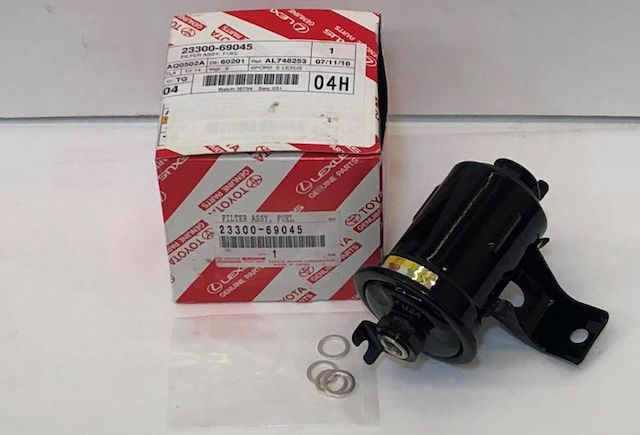Are OEM Toyota Fuel Filters Better Than Aftermarket?
Do you have a fuel filter on your Toyota that needs to be replaced? If so, you may be wondering which replacement filter offers the most value: OEM or aftermarket. This guide has all the information you need about OEM and aftermarket fuel filters. We'll help you stack up both options against each other.
Let's go over all the important factors of a fuel filter:
1. Filter Material Quality

Image Credit: rambus56
The filter material is what traps impurities in the fuel. The quality of the filter material is the most important characteristic of a fuel filter. The filter material should be:
- Durable enough to stand up to 60 psi of pressure for the life of the filter
- Porous enough to let fuel through but not too porous to let impurities through
- Have deep, tightly spaced pleats so there is enough filtering capacity to prevent clogging for the life of the filter
You can count on the fact that the pleated material in OEM Toyota fuel filters meets all the criteria above. Toyota spends a lot of engineering time developing and testing fuel filters for it's vehicles.
The filter material quality isn't guaranteed in aftermarket fuel filters. Many aftermarket manufacturers will claim that they use top quality filter material. But how many of those claims are actually true? It's pretty much impossible to check the quality of the material inside a fuel filter without disassembling it. It's common for aftermarket manufacturers to cut corners with low quality filter materials. It may be because they know that their customers can't tell the difference until it's too late.
If you ask us, it's smart to play it safe and use what you know is high quality: OEM fuel filters.
2. Fitment

Image Credit: Engineered Mojo
When it comes to fuel filters, fitment is important. You want a fuel filter that:
- Is big enough to allow adequate fuel through at all times
- Is easy to install
- Doesn't leak
The slightest difference in size can affect your filter's performance and ease of installation. Toyota has direct involvement in the production of OEM fuel filters, so perfect fitment is guaranteed with OEM filters. They're made to OE specs.
Aftermarket manufacturers design their fuel filters to their own discretion. They may or may not follow OE specs. In fact, leaking is quite common with aftermarket fuel filters. Amazon is chock full of complaints about leaking aftermarket Toyota fuel filters. We rounded up a few:
- "The connection on the engine side of the filter is leaking. I tightened the nut to the point where I think it might've stripped the threads, but it's still leaking. This filter has over spray on the threads at each end of the filter. It looks like there is over spray on the cone that goes into the flared fuel line, too. Most likely this is why I can't get a tight seal. The manufacturer could have these areas masked off during the painting process but that might cost them $0.10 to $0.20 per filter. So, instead they chose to make a poor quality filter so they could make a few more cents per filter."
- "I installed the filter and it leaks gas. I retightened it, but it still leaked gas. I have no option to return this leaking filter to get my money back. Buyer beware!"
- "This aftermarket fuel filter does not have correct thread size for the factory connectors on 2002 2.7 Tacoma. It's too late to return it."
- "I installed this aftermarket fuel filter, and it leaked. I reinstalled the filter multiple times and it just kept leaking."
3. Warranty
On older cars, fuel filters should last about 30K miles, or 2 years. On newer cars, fuel filters should last the lifetime of the vehicle. Either way, fuel filters should last a while. That's why you want a fuel filter that comes with a comprehensive warranty policy. In that case, Toyota's got you covered. Most OEM Toyota parts come with a 12-month, unlimited mile warranty.
Aftermarket parts rarely come with a warranty. That's part of the reason why aftermarket parts are so cheap. Even if you're lucky enough to find an aftermarket manufacturer that offers a warranty, chances are the warranty doesn't cover much. Trying to save a few pennies on an aftermarket fuel filter can backfire on you. Not only would you be stuck with a malfunctioning fuel filter, but you also would likely have to buy a new filter.
The Bottom Line

OEM is the far better and more economical choice. Aftermarket fuel filters fall short in terms of material quality, fitment, and warranty. It's because while an aftermarket fuel filter functionally replaces the original part, it's not an exact fit. Nor does it meet or exceed Toyota's quality standards. Issues will arise because of that.
Despite all that, some Toyota owners still buy aftermarket replacement fuel filters. It's because aftermarket filters cost less than OEM filters at the cash register. "At the cash register" is the operative term here. Aftermarket filters can be cheaper upfront, but OEM filters cost less in the long run. That's because OEM filters last longer and don't cause as many issues as aftermarket ones. You know how the saying goes, you get what you pay for.
Still hesitant to spend a pretty penny on an OEM filter? No problem. You can get a genuine OEM fuel filter from us at wholesale pricing. You'll get about 30% off regular pricing. Here's our catalog. You'll see that you can score an OEM fuel filter at aftermarket pricing. Talk about getting the best of both worlds!
Do you need help finding the right fuel filter for your Toyota model? Contact us. We'll be happy to help!
Written by Jason Lancaster

